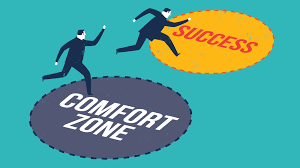Comfort zone, when we can do things easily and not even tear a sweat while doing it. While we can do these things easily and very well, we don’t improve ourselves while doing it. We may master things, and we may become more consistent, but improvement and success lie outside of our comfort zone.

Some people strive and struggle outside of their comfort zone to get better and improve themselves. Others do not step outside of their comfort zone and continue doing things the way they are used to, the way they already mastered it. Improvement comes from outside your own comfort zone, doing harder things than you are used to. If someone doesn’t struggle and tries hard to do something, he won’t be able to improve.
When you think of anything, just anything in life, ranging from studies to sports, every improvement comes from embracing discomfort. To give an example, if you play volleyball against opponents that are significantly worse than you, you will not improve, because you will not try to find new ways to stop stronger and more well-coordinated attacks. In studies even, if you can solve an easy math test and you solve easy tests over and over again, you have mastered the easy questions. But what about the harder ones, the ones you need to really put your brain to the test? Those questions improve your understanding of the topic, unlike simpler questions.
This is why people need to step outside of their comfort zone to improve. Of course not being in your comfort zone is

not as relaxing or easy. Though, discomfort is the way to get far in anything. The thing that separates successful people from average people is the amount of time they can stay uncomfortable and how much they can challenge themselves. But the feeling outside one’s comfort zone is not something that can be ignored and it generally stops people from even trying to start to improve. Even when someone starts to improve a skill of theirs, being consistent with their training is much harder than starting the activities but the end result is really rewarding and confidence-building, which is required for further improvement of a person.
To sum it all up, if someone wants to improve, they should go outside of their comfort zone where they struggle with their tasks and activities. Discomfort is the most effective way to go when some skills are wanted to be improved and the “end result” a person gets when they are consistent in their training or activity, is really precious for the person. The feeling and happiness it brings are much more valuable than short-term comfort which are the activities this person would be doing rather than challenging himself.

